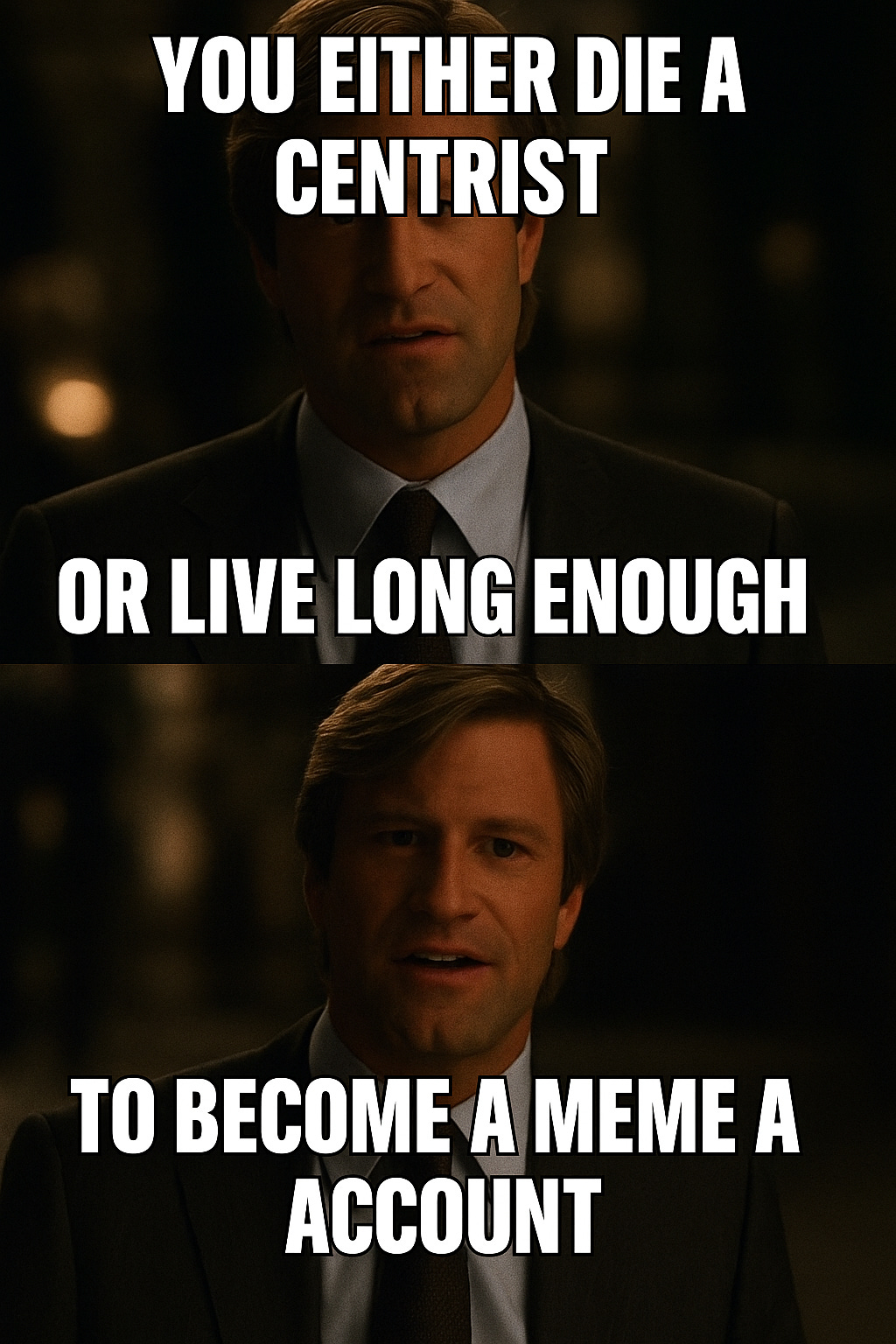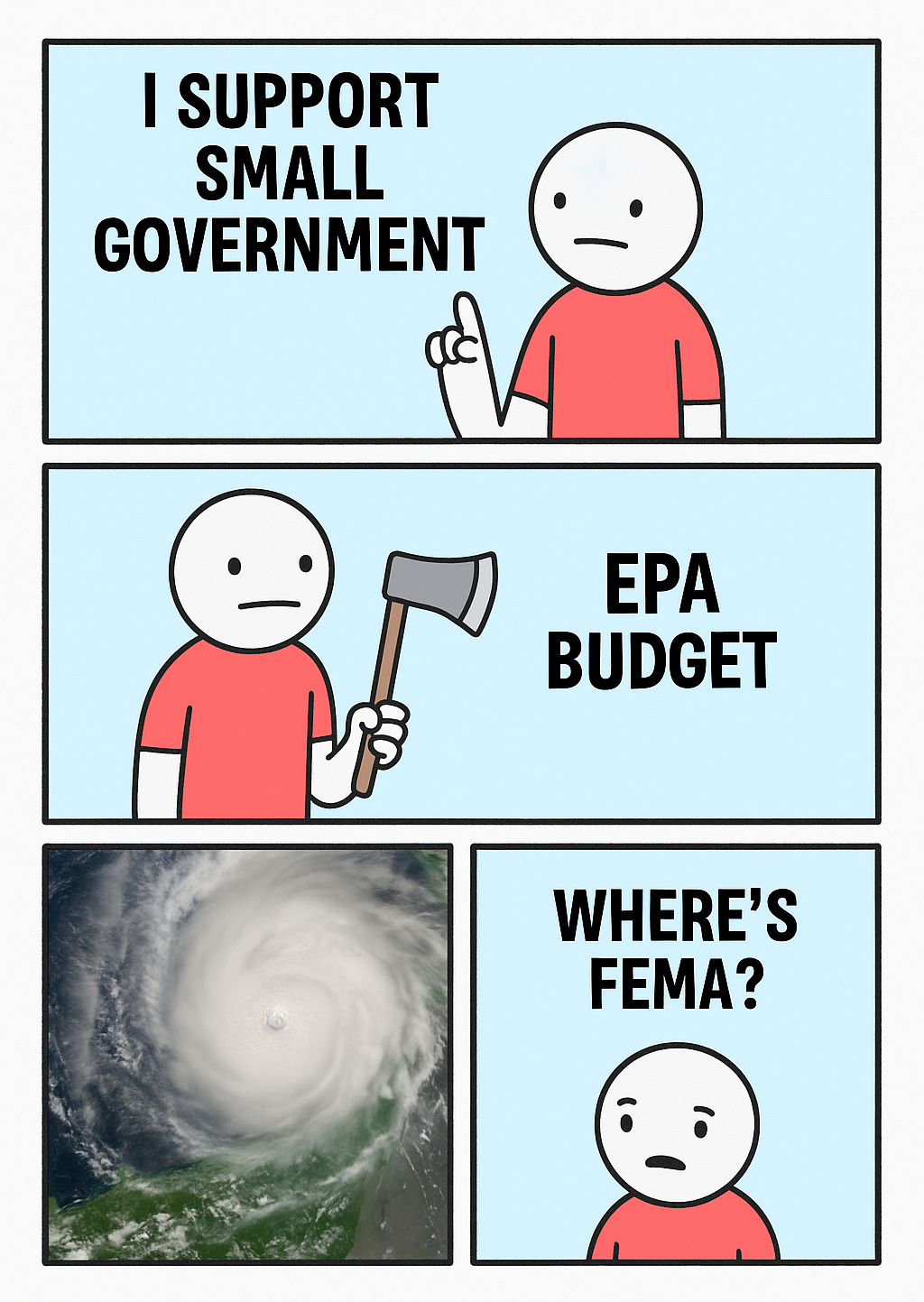What The Realist Ledger Is—and Why It Exists?
For People Who Read Policy Papers and Shitpost—Sometimes at the Same Time
Welcome to The Realist Ledger, a U.S. political commentary newsletter for people who care about the future of the country but are also deeply allergic to the performative outrage Olympics that is modern media.
If you're politically engaged but can’t stomach another round of “our team good, their team evil,” you're in the right place. We're not here to help you pledge allegiance to the Red Team or the Blue Team. We're here to point out that both teams are running in circles while the stadium burns down.
We write for a generation who grew up watching hope get filibustered, bipartisanship turned into a myth, and nuanced opinions reduced to a binary quiz with no skip button. Our tone? Realist. Sometimes dry. Often sarcastic. Occasionally a little pissed off. But always grounded in facts, science, and nonpartisan reality checks—not vibes, and definitely not whatever someone’s uncle posted on Facebook.
Why We’re Here (and Why You Might Be, Too)
Let’s not sugarcoat it: American politics is... tired. Like, waking-up-and-it’s-still-Monday tired.
We’re in a time when bipartisanship is about as likely as a MySpace comeback. Partisan divisions in Congress are at historic highs, with ideological overlap between Democrats and Republicans nearly disappearing over the last two decades1. Trust in government is also at a historic low, with only 20% of Americans saying they trust the government to do what is right "most of the time"2.
Candidates aren’t chosen for their values anymore—they're chosen because they “get votes,” even if their records look like walking HR violations.
Congress is gridlocked. The Supreme Court has become a partisan flashpoint3. And the culture war? It's no longer a metaphor. It's just the everyday noise we live in.
That noise? It trickles down. Social media is now a hyper-personalized rage machine, where disagreement equals moral failure and nuance gets filtered out faster than an OnlyFans refund4.
College campuses, once havens for critical thought, now skew heavily in one direction5. The public square? No room for gradients. You're either too woke or a literal fascist. There’s no middle. No healthy disagreement. Just tribalism dressed in hashtags.
And yeah, we’re tired of being tired. Or, as scholar Jacoby Shaddix of the political theory collective Papa Roach once said:
“Sick and tired of being sick and tired.”
— Jacoby Shaddix, “Be Free” (2004)
(See? Even post-hardcore bands are better at diagnosing American malaise than Congress.)
What The Realist Ledger Actually Does
We’re not just here to roast. We’re here to diagnose.
The Realist Ledger is about cutting through the noise and asking: “Does this make sense?” Not “Is this what my party says?” Not “Is this what Twitter thinks?” Just—does it hold up?
We tackle real issues—immigration, climate, education, healthcare, race and gender policies, democracy itself—with receipts in hand and bias checked at the door. And if someone proposes something sensible, we’ll say so—regardless of party affiliation.
We’re not here to turn you into a centrist. We’re here to turn you into a functioning adult with critical thinking skills and a decent Wi-Fi connection.
Also: we want you involved. Read. Share. Screenshot with snarky captions. Email your reps. Send memes to your dad. Whatever works. Just don’t sit it out.
Let’s Be Honest: Both Parties Are a Hot Mess
We’ll be blunt: no one’s clean here.
🧂When Good Intentions Go Bad: Democratic Policy Misfires
Democrats often mean well. Their hearts are in the right place. Their policies? Sometimes... not so much.
🚬 Vaping Regulations
In an attempt to protect youth, Democrats supported restrictions on flavored e-cigarettes. The result? A black market surge and a win for Big Tobacco. Studies from the CDC, JAMA, and the FDA suggest these bans pushed some teens back to traditional cigarettes while leaving menthols and disposable vapes untouched678.
🏚️ Low-Income Housing Strategy
The goal: solve homelessness. The result: “affordable housing” built in segregated, underserved areas with poor transit and fewer jobs. According to Brookings and the Urban Institute, this ends up isolating communities instead of integrating them910.
📊 Education Spending
The U.S. spends more per student than nearly any other country. But NAEP scores remain stagnant. NCES data suggests that much of the increased spending is absorbed by bureaucracy, not classrooms1112.
🛠️Efficient, But Ideologically Flawed: Republican Policy Pitfalls
Republicans are often wildly efficient at passing laws fast. Unfortunately, speed doesn’t mean sense.
📚 Book Bans & Anti-LGBTQ+ Laws
Framed as protecting children, these policies often suppress diverse voices. PEN America reports a record-high number of book bans in 2023—most targeting books about race, gender, or sexuality13. Meanwhile, inclusive environments like those studied by GLSEN improve student well-being and academic outcomes14.
👮 “Tough on Crime” Theater
Cash bail, mandatory minimums, stop-and-frisk—the usual. Research from the Brennan Center and Pew shows these strategies don’t work long-term and often reinforce systemic inequality1516.
🌎 Climate Rollbacks
Deregulation wins headlines, but the cost is rising. The EPA and International Energy Agency warn that delaying action on climate change could cost the U.S. billions annually in economic and health losses1718.
We Don’t Take Sides—We Take Facts Seriously
Depending on the topic, we might sound center-left to some, center-right to others. We don’t care. We don’t track where we land on the political compass. We track whether the compass still works.
Because when you zoom in, most people don’t sit neatly in one ideological camp. You might be pro-choice and pro-gun. Pro-immigration and anti-regulation. American political identity is a patchwork—so why are we forcing everyone into binary tribes?
We need nuance. We need accountability. We need checks and balances—not vibes and team jerseys.
Welcome to the Club
If you’ve ever wanted to throw your phone into the sea but also write your senator a strongly worded email, welcome.
This is The Realist Ledger.
Let’s get real.
Pew Research Center. “Americans’ Dismal Views of the Nation’s Politics.” Pew Research Center, 2023, www.pewresearch.org/politics/2024/americans-discontent-with-the-political-system/.
Gallup. “Trust in Government.” Gallup, 2024, https://news.gallup.com/poll/5392/trust-government.aspx.
Howe, Amy. “Argument Analysis: Justices Divided and Hard to Read on Partisan Gerrymandering.” SCOTUSblog, 26 Mar. 2019, www.scotusblog.com/2019/03/argument-analysis-justices-divided-and-hard-to-read-on-partisan-gerrymandering/.
Arthur, Charles. Social Warming: How Social Media Polarizes Us All. The Indigo Press, 2021.
al-Gharbi, Musa. “Data on How Ideological (Under)Representation Compares to (Under)Representation Along the Lines of Race, Gender or Sexuality.” Heterodox Academy, 29 Mar. 2018, heterodoxacademy.org/blog/ideological-underrepresentation-compared-to-race-gender-sexuality/.
Centers for Disease Control and Prevention. “E-Cigarettes and Youth: What Educators and Parents Need to Know.” Centers for Disease Control and Prevention, 17 Oct. 2024, www.cdc.gov/tobacco/e-cigarettes/youth.html.
Anderer, S. “Flavored E-Cigarette Bans Might Increase Young Adults’ Cigarette Smoking.” JAMA, vol. 333, no. 8, 2025, p. 657, doi:10.1001/jama.2024.28060. www.jamanetwork.com/journals/jama/article-abstract/2829692.
U.S. Food and Drug Administration. “Results from the Annual National Youth Tobacco Survey.” FDA, 2023, web.archive.org/web/20240203171443/https://www.fda.gov/tobacco-products/youth-and-tobacco/results-annual-national-youth-tobacco-survey. Accessed 9 June 2025.
Glaeser, Edward, and Joseph Gyourko. “America’s Housing Affordability Crisis and the Decline of Housing Supply.” Brookings, 26 Mar. 2025, www.brookings.edu/articles/americas-housing-affordability-crisis-and-the-decline-of-housing-supply/.
Solari, Claudia D., Christina Plerhoples Stacy, and Brendan Chen. “Building More Homes Isn’t Enough to Solve the Housing Crisis.” Urban Institute, 28 Mar. 2025, www.urban.org/urban-wire/building-more-homes-isnt-enough-solve-housing-crisis.
U.S. Department of Education, National Center for Education Statistics. “Public School Expenditure.” Condition of Education, 2024, nces.ed.gov/programs/coe/indicator/cmb/public-school-expenditure.
Schaeffer, Adam B. “The Real Cost of Public Education.” Cato Institute, 8 Sept. 2010, www.cato.org/commentary/real-cost-public-education.
PEN America. "Banned in the USA: State Laws Supercharge Book Suppression in Schools." PEN America, 2023, https://pen.org/report/banned-in-the-usa-state-laws-supercharge-book-suppression-in-schools/.
Kosciw, Joseph G., Caitlin M. Clark, and Leesh Menard. The 2021 National School Climate Survey: The Experiences of LGBTQ+ Youth in Our Nation’s Schools. GLSEN, 2022, www.glsen.org/sites/default/files/2022-10/NSCS-2021-Full-Report.pdf.
Roeder, Oliver, Lauren-Brooke Eisen, and Julia Bowling. What Caused the Crime Decline? Brennan Center for Justice, 2015, https://www.brennancenter.org/our-work/research-reports/what-caused-crime-decline.
Gramlich, John. "What the Data Says About Crime in the U.S." Pew Research Center, 24 Apr. 2024, https://www.pewresearch.org/short-reads/2024/04/24/what-the-data-says-about-crime-in-the-us/.
U.S. Environmental Protection Agency. “Economics of Climate Change.” EPA, www.epa.gov/environmental-economics/economics-climate-change.
International Energy Agency. Net Zero by 2050: A Roadmap for the Global Energy Sector. IEA, 2023, https://www.iea.org/reports/net-zero-by-2050.






